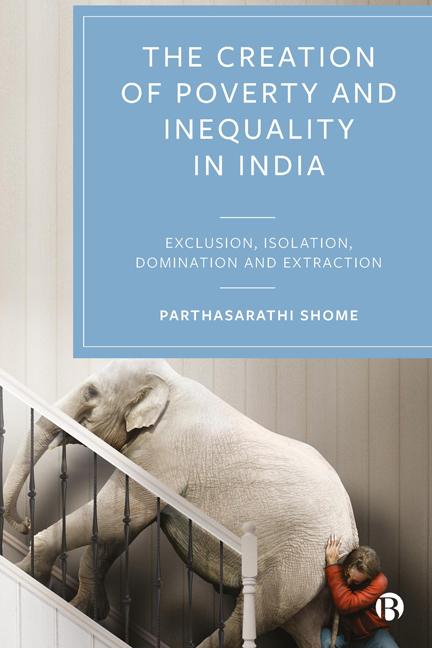Book contents
- Frontmatter
- Dedication
- Contents
- List of Figures and Tables
- Preface
- 1 Introduction
- Part I Macro-Economy and Human Development
- Part II Sources of Inequality and Poverty
- Part III Sectoral Effects
- Part IV Radical Humanism
- Appendix 2.1 Cash Use in India: A Cross-Country Comparison
- Appendix 2.2 Macro-Economic Comparisons: Selected Economies
- Appendix 4.1 Selected Country Tables
- Appendix 5.1 Evidence on Inequality in the US
- Appendix 8.1 Impact of Land Policy
- Appendix 11.1 Impact of Asset Transfer on the Poor
- Index
5 - Racism, Colonialism and Slavery as International Practices
Published online by Cambridge University Press: 18 January 2024
- Frontmatter
- Dedication
- Contents
- List of Figures and Tables
- Preface
- 1 Introduction
- Part I Macro-Economy and Human Development
- Part II Sources of Inequality and Poverty
- Part III Sectoral Effects
- Part IV Radical Humanism
- Appendix 2.1 Cash Use in India: A Cross-Country Comparison
- Appendix 2.2 Macro-Economic Comparisons: Selected Economies
- Appendix 4.1 Selected Country Tables
- Appendix 5.1 Evidence on Inequality in the US
- Appendix 8.1 Impact of Land Policy
- Appendix 11.1 Impact of Asset Transfer on the Poor
- Index
Summary
Introduction
This chapter attempts to reveal how racism and colonialism have comprised important factors in the genesis of poverty and inequality across the world. It would be pertinent to begin with a quote from Gilroy (2019):
Du Bois had learned about the world's ‘race problems’ by placing colonial rule, the Third Reich and the US racial order in historical, moral and conceptual relation. (p 3) The widespread appeal of racialised group identity and racism, often conveyed obliquely with a knowing wink, has been instrumental in delivering us to a situation in which our conceptions of truth, law and government have been placed in jeopardy. (p 1)
The attractiveness of generic racial identities is part of a psycho-political shift that has encouraged fascination with ossified culture: lacking vitality but easily regulated. The invocations to whiteness now circulating in Europe are freighted with notions of victimage and vulnerability. (p 2)
This chapter will pursue arguments along the earlier-mentioned lines in an attempt to establish their roles in perpetrating poverty and inequality.
Genesis of poverty and inequality
A reflection on the incidence of poverty and inequality globally leads to an inevitable conclusion, that they are not self-generated but are constructed, imposed and often perpetuated.
The genesis of inequality and, consequently, of poverty is a timeless phenomenon of societies. Indeed, the very nature of Man in its ability to remain in a state of opacity regarding the phenomenon, has to be pondered. In that vein, poverty and inequality must reflect certain societal beliefs and actions that must generate and elevate them. They comprise,
• first, to exclude, a portion of society from the rest. Exclusion can be specified in various ways. The more the exclusion is layered, the higher is the number of exclusion criteria and excluded categories generated;
• second, to isolate the excluded categories preferably into non-intersecting groups, more often than not by locating their residences apart and prohibiting any social interaction between them except for well-defined economic functions for which the input of a particular category may be needed by another category;
• third, to dominate them in as many ways as possible thus ensuring that the economic return diminishes per unit of work as the order of categories is descended even if those occupying the bottom categories approach extreme poverty;
- Type
- Chapter
- Information
- The Creation of Poverty and Inequality in IndiaExclusion, Isolation, Domination and Extraction, pp. 99 - 137Publisher: Bristol University PressPrint publication year: 2023

